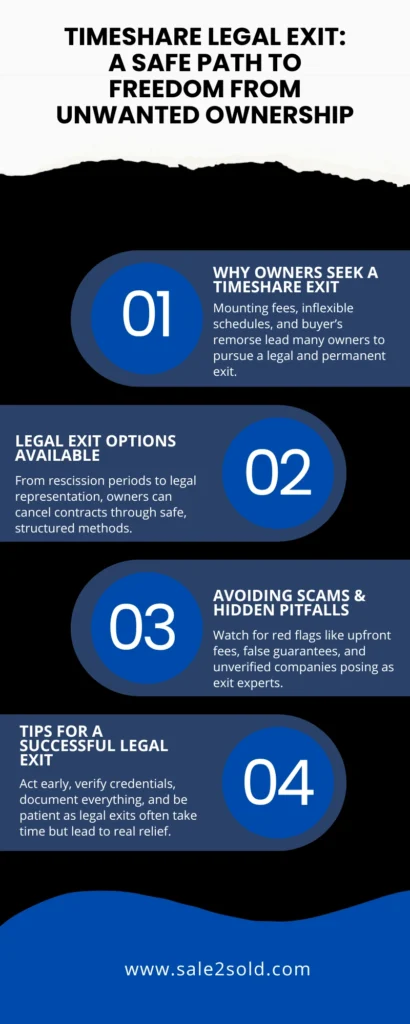How to Get Out of a Timeshare Legal Exit Guide


Table of Contents
ToggleTimeshare legal exit are sold as a convenient way to secure yearly vacations, but for many owners, the reality is different. Rising maintenance fees, special assessments, and rigid usage schedules quickly turn what seemed like a wise decision into a burden. Over time, these costs pile up, and owners begin to question whether keeping the contract makes sense. According to consumer surveys, a significant percentage of timeshare legal exit buyers regret their purchase within a few years.
This is where a Timeshare Legal Exit comes into play. Unlike simply walking away, which can lead to legal trouble or credit damage, a legal exit is a structured process that uses laws, contracts, and negotiation to free owners from their obligations permanently.
A Timeshare Legal Exit is the process of ending a timeshare contract through legitimate legal channels. Instead of defaulting or ignoring payments, this method ensures the owner is released without future liability. It can involve rescinding the contract within the allowed period, negotiating with the resort, or hiring legal professionals to challenge unfair terms.
What makes this process critical is that timeshare legal exit contracts are designed to be challenging to break. They often include clauses that restrict cancellation, transfer, or resale. That’s why having a clear understanding of legal exit options is essential for avoiding costly mistakes.
Exiting a timeshare contract is not always straightforward, but several options exist depending on your situation.
Every timeshare legal exit contract comes with a rescission or cooling off period. This is a short window, often between three and ten days after purchase, when owners can cancel without penalty. If you’re still within this period, send a cancellation notice immediately following the resort’s instructions. Missing this deadline means you’ll need to explore other solutions.
Some resorts offer a program where owners can voluntarily surrender their timeshare legal exit. Known as a deed back, this option allows you to return the property to the developer. However, it usually requires that your payments are current and that the resort is willing to accept the property back. It’s worth asking the resort directly about this possibility.
Another option is selling or transferring your ownership to another party. However, the resale market for timeshare legal exit is oversaturated, and many have little or no resale value. Owners should also be cautious of companies that claim to have buyers lined up but ask for hefty fees upfront. These are often scams.
When you’re outside the rescission period and cannot surrender or sell the timeshare, legal intervention becomes the best route.
An attorney specializing in timeshare law understands the complexities of these contracts. They can identify misrepresentations made during the sales process, exploit contract loopholes, and use consumer protection laws to negotiate or litigate for cancellation. Although hiring a lawyer involves costs, it dramatically increases your chances of success.
Some companies advertise timeshare exit services. While some are legitimate, many are not. If you choose to work with one, make sure they partner with licensed attorneys and provide a written agreement outlining the process. Avoid companies that promise guaranteed cancellations without reviewing your case.
When all else fails, court action may be necessary. Lawsuits can be filed if the contract was obtained through fraud or deception. State consumer protection laws also give owners leverage in disputes with resorts. While this is a more time consuming and costly path, it can successfully release owners from contracts under the right circumstances.
One of the biggest obstacles in this process is avoiding scams. The timeshare exit industry is notorious for fraudulent operators who prey on frustrated owners. These scammers promise quick exits, ask for upfront payments, and often disappear without delivering results.
Signs of a scam include:
Reports indicate that consumers lose millions annually to these fraudulent companies. To avoid becoming a victim, verify the credentials of anyone offering to help you with a Timeshare Legal Exit.
The cost of a legal exit varies depending on the method used.
While these costs may seem high, they are often far less than the lifetime expense of ongoing maintenance fees and special assessments.
A successful Timeshare Legal Exit takes time, but patience and the right approach ensure a permanent resolution.
Industry statistics reveal that owners who hire legal professionals have significantly higher success rates compared to those who try to cancel on their own. Cases involving proven misrepresentation during the sales process often result in contract cancellations and, in some cases, refunds.
For example, several groups of owners have successfully sued resorts over deceptive practices, resulting in contract terminations. These real world outcomes show that with proper legal support, achieving a timeshare exit is possible.
Escaping a timeshare contract can seem overwhelming, but it’s entirely achievable with the right strategy. A Timeshare Legal Exit allows owners to break free from expensive, long term obligations safely and permanently. By understanding your rights, avoiding scams, and working with trusted professionals, you can move forward without the financial stress of unwanted ownership.
If rising fees and inflexible contracts have left you feeling trapped, now is the time to explore your legal options and take control of your future.